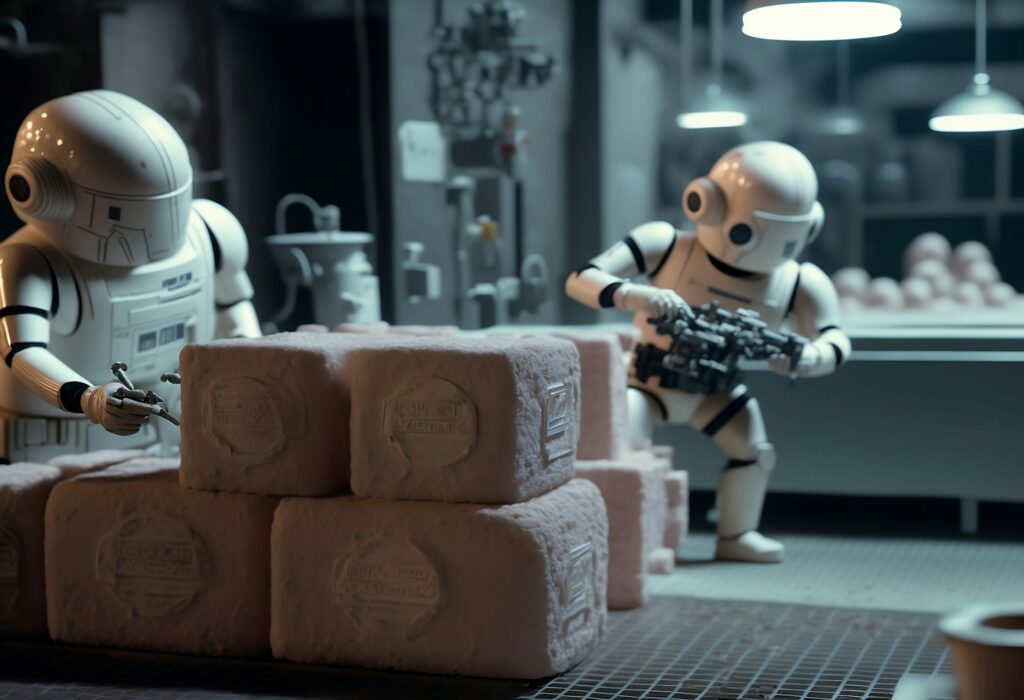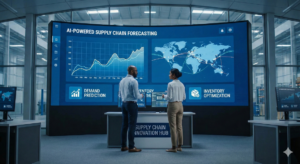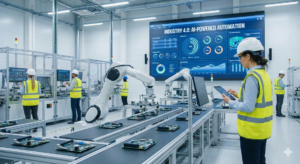The Revolution in Artificial Intelligence in 2025: How It Is Changing Everyday Life and Work

The Revolution in Artificial Intelligence in 2025: How It Is Changing Everyday Life and Work
At this point in time, artificial intelligence is no longer only a term in the world of technology; rather, it has become an integral part of our daily lives. In the year 2025, artificial intelligence has developed from a technology that operates behind the scenes into a force that is visible and interactive, and it is transforming the way that we work, study, shop, and even communicate with one another. This change encompasses more than simply software or electronic devices. It is resulting in the transformation of whole sectors and habits, often in ways that we are not even aware of.
Allow me to explain how artificial intelligence is transforming the world around us, as well as what this implies for you.
“Artificial Intelligence in Your Pocket: Smarter Devices, More Personal”
All along, your phone has been a smart device. On the other hand, it is now more similar to your digital assistant than it ever been before. When 2025 arrives, AI-driven functionality will go beyond basic requests. These days, mobile devices like smartphones and smartwatches are able to learn your habits, make suggestions for activities before you ever think of them, summarize your emails, compose messages, and even indicate when you should take a break.
As a result of the incorporation of emotional tone and context, voice assistants have grown much more human in their responses, making them seem less robotic and more conversational. Artificial intelligence is even integrated into camera applications, increasing the quality of low-light photography, enabling automated picture editing, and assisting users who are visually challenged in recognizing things in real time.
Artificial Intelligence in the Workplace: Competitors or Co-Workers?
A significant shift has taken place in the working environment. Through the use of artificial intelligence (AI) products like as automated report writers, real-time language translators, and virtual meeting aides, productivity has increased and tiresome activities have been eliminated. Artificial intelligence is currently being used by professionals in fields such as marketing, finance, legal, and design to develop ideas, verify compliance, and even write code.
On the other hand, this transition is accompanied with questions. Despite the fact that many workers are more productive with the assistance of AI, others are afraid about their job security. The fact of the matter is that artificial intelligence is not completely replacing people; nonetheless, it is altering the nature of occupations. At the same time as monotonous, rule-based jobs are being more mechanized, there is a growing need for creative thinking, emotional intelligence, and strategic thinking.
AI in Education: Learning That Adapts to You and Your Needs
By using AI, educational institutions are able to tailor the learning experience. Now more than ever, students have access to learning systems that may adjust to their own speed and learning style. For instance, if a student is having difficulties grasping a mathematical subject, the system will present more examples, modify the level of difficulty, and provide real-time feedback that is specifically customized to the student’s requirements.
AI technologies are helpful for instructors in a number of ways, including grading, identifying pupils who may want further assistance, and finding learning gaps. It is now possible for educators to devote more time to mentoring and less time to doing regular administrative tasks.
- Everyday AI: From Groceries to Driving Artificial intelligence has made its way into the everyday aspects of humans’ lives as well.
- Using your purchasing history, grocery apps may provide recommendations for items that are either healthier or more cost-effective.
- Smart refrigerators are able to monitor the dates of expiry and design meals depending on the ingredients that are currently in the refrigerator.
- By making adjustments to the timing of traffic signals in real time, artificial intelligence-powered traffic systems in cities can minimize congestion and pollution.
Automobiles that drive themselves are no longer considered experimental; rather, they are beginning to become a common mode of transportation in test zones, where they are used to carry products and transport passengers along predetermined routes.
A Surprising Compatibility Between Artificial Intelligence and Creativity
Many people believed that artificial intelligence would only have an impact on activities that included reasoning. On the other hand, in the year 2025, it is also motivating musicians, authors, and painters. There is a profusion of artificial intelligence-generated music, narrative ideas, and design recommendations. Creativity is not being replaced by it; rather, it is being enhanced. The application of artificial intelligence allows designers to generate ideas more quickly, writers to get assistance in arranging story structures, and filmmakers to produce effects with fewer costs.
Is Everyone Happy About It?
Not in every way. Even if artificial intelligence is convenient, it also presents significant risks. An extensive discussion is taking place on a number of topics, including algorithmic bias, employment displacement, data management, and privacy. There is now a lot of demand on governments and businesses to set ethical guidelines for artificial intelligence that safeguard consumers while still stimulating research.
As artificial intelligence (AI) continues to advance, the emphasis is shifting away from what it can accomplish to how it can be utilized in a responsible manner.
Remarks to Conclude
In the year 2025, artificial intelligence is not something that is figment of the imagination. It is a component of both our way of life and our way of working. The applications that we use, the work that we perform, and even the choices that we make are all heavily influenced by it.
It is not the question of whether artificial intelligence will transform the world so much as it is the question of how we will direct that change in a manner that will benefit everyone. At the individual level, the first step in adjusting to the future that is now here is to have an awareness of how artificial intelligence (AI) affects our lives.




